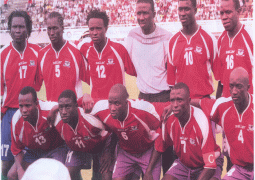A two-day simulation workshop on human-to-human Influenza organised by the Gambia Red Cross Society, in collaboration with the Ministry of Health and the International Federation of Red Cross Societies is currently underway at the Boabab Beach Hotel and Resort, in Kololi.
It seeks to promote the objective of understanding the complexities of the pandemic response and the need for clear control and decision-making mechanism, anticipated strategies, uncertainty and rapidly evolving circumstances, and be able to identify planning and response needs.
The simulation workshop is being organised in preparation for the challenges to prevent virulent influenza occurring in many parts of the developing countries, particularly in
Addressing the participants, the Director of Health Services, Dr Bekai Camara stated that the Human Pandemic Preparedness (H2P) is based on the comprehensive plan developed in September 2007, to help The Gambia prepare and respond to Avian and Human Influenza (H5N1).
According to him, it explains the priority areas and articulates to ensure the health, safety and security of the citizen in an event when the pandemic occur.
The overall goal of the proposed interventions, Heath Service Director added, is to ensure health and safety of the entire population during phases 1-6 of the human pandemic.
Dr Camara stated that the influenza illness is one of the many hazards facing The Gambia, adding that the nation has had recent experience with many human and animal health related emergencies, including cholera and locust outbreak. This experience, Dr Camara continued, "tells us how we can tackle this threat if we are properly prepared."
"The threat of human pandemic preparedness is a matter of tremendous global importance. Simulation exercise are seen as essential to continually test and improve the planning and preparedness process in The Gambia, and also engaged a broad range of stakeholders in this process," he told participants.
Speaking earlier, the Secretary-General of the Gambia Red Cross Society, Mamadou Bah disclosed that the pandemic has grown over the past few years to become a global threat to lives and livelihoods, noting that the virulent human flu has spread remarkably fast from East Asia to the rest of the world with outbreak in all parts of the Asia, some countries in Europe and Africa.
He disclosed that the disease is an air borne and can spread easily from person-to-person, particularly in the absence of proper environmental sanitation and hygiene. He said GRCS is a voluntary organisation in the country with over 15000 registered volunteers, covering every single community in the country.
Other speaker includes Katim Touray, Health Programme Officer and H2P Coordinator, who gave an overview of the project and the workshop.
Read Other Articles In Article (Archive)
We mourn with our people in Senegal
Jul 17, 2017, 10:53 AM


